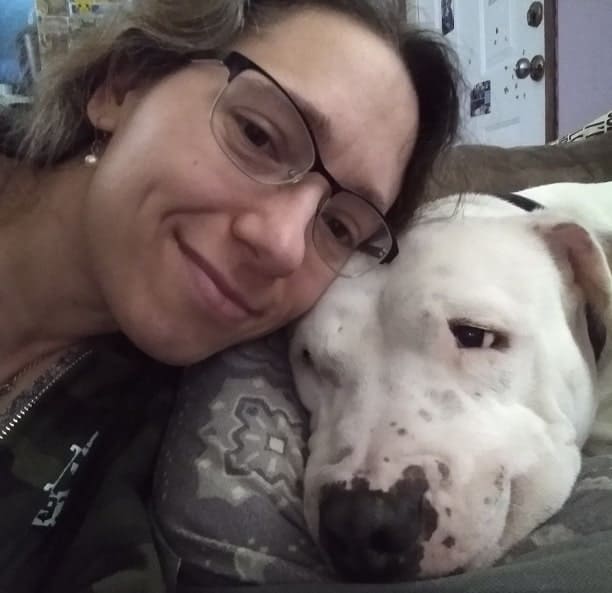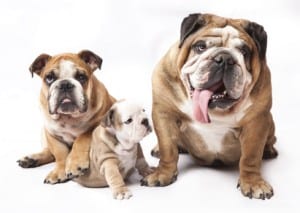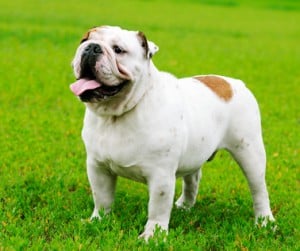Despite its fierce appearance, the typical Bulldog temperament is a more gentle and courageous lover than a fighter. Breeders created the English Bulldog (or just “Bulldog”) in early 19th century England to bait bulls (hence the name). This gave rise to his reputation as an aggressive dog.
However, careful breeding in recent years has removed the aggression and in its place is an amiable and easygoing dog. Other breeds of dog that belong to the Bulldog group include the American Bulldog and the French Bulldog.
The Bulldog Temperament and Personality
Many people don't consider the Bulldog when they are choosing a dog for their family, which is a shame because his temperament makes him a wonderful pet.
Here are a few of the key Bulldog temperament traits you must know if you decide to bring one home.
But first check out…
Watch Video of Bulldog
Gentle and Gregarious
These dogs are very loving and have seemingly endless patience when children want to wrestle and tumble with them.
You can expect your Bulldog to practically demand cuddles, and he will take as much affection as he can get. Just be sure to have a towel handy, as he produces an awful lot of drool!
Bulldogs tend to be lazy, so they are perfectly happy snuggling up on the couch with you.
They don't need much exercise – in fact, too much exercise can actually be dangerous for them. The reason for this is two-fold. First, their short noses make breathing difficult; and second, they are prone to heat stress.
This makes them the perfect dogs for apartment living, or for homes with small backyards.
If you are going to bring home a Bulldog, be prepared to have your dog living inside with you at all times.
In other words, don't leave him alone for long periods of time. He does not like to be alone for too long, and if he gets bored or lonely, you can expect him to channel his negative feelings into destructive behaviors.
Stubborn as a Bulldog
If you are looking for a dog who is obedient and easily trained, then look elsewhere.
The Bulldog isn't known for his intelligence or even his trainability. He can be positively stubborn and even willful at times.
There’s a reason why tough attorneys have the nickname of being “bulldogs” in the courtroom.
In fact, in a study of the top 80 dog temperaments for obedience and working intelligence, the Bulldog ranked 78th!
That doesn't mean you shouldn't train your Bulldog at all. It just means that you have your work cut out for you with him.
He can still learn new tricks, and you still need to teach him that you are his master. You should only use positive training methods and food rewards because harsh or compulsive techniques just won't work with the Bulldog.
Just keep the food rewards to a minimum – you don’t need an overweight dog on your hands!
Something else important to note about training your Bulldog is his tendency to chew. Some dogs grow out of chewing on their toys – not the Bulldog!
You must train him while he is still young to release what is in his mouth when you tell him to. You can use the game of tug-of-war to teach him this. This is also another way in which you can combat his food aggression.
Alert Bulldog Temperament
The Bulldog’s appearance is often enough to deter unwanted visitors, but his alert temperament also makes for an effective guard dog.
Because they bond very closely with their family, and because they tend to be suspicious of people they don't know, Bulldogs will bark or growl at potential intruders.
He should calm down, though, once you invite the person into your home, and he realizes they are not actually a threat.
Despite their size, Bulldogs can actually cover short distances very quickly. And a growling Bulldog in attack mode will look quite frightening to any intruder!
Aggressive Bulldog Temperament
You must carefully manage an aggressive dog temperament to avoid potential injury to your family members and other pets.
While the Bulldog’s behavior has softened over the years, you may still see some aggressive tendencies pop up particularly around dinner time.
Bulldogs do not like the idea of sharing their meals, and they will guard their bowls fiercely. Keep your children away from your Bulldog at feeding time, and if you have any other pets, take precautions and feed them in another room.
Male Bulldogs may also show aggression toward other male dogs, particularly if they are not well socialized.
You can reduce the likelihood of this happening and make sure your Bulldog is accepting of other dogs by putting him in puppy pre-school at a young age.
You should also continue exposing him to other dogs on a regular basis as he grows up.
Training classes and play dates with friends' dogs are ideal for helping him become acclimated to the ways of other dogs.
Helpful Dog Training Resource
For help with training your Bulldog, you should take a look at The Online Dog Trainer by Doggy Dan. Doggy Dan is an expert Dog Trainer based in New Zealand. His online resource contains Hundreds of Excellent Dog Training Videos that will take you step-by-step through the process of developing a healthy, happy well-behaved dog.
Grooming
Brush your Bulldog two or three times a week for about 10 minutes each time to keep him looking neat and clean.
Check the wrinkles on his face regularly to make sure his skin is clear and free of food or moisture. Either of these can become trapped and lead to irritation and/or infection.
You can clean his skin with peroxide and pat it with corn starch to dry it. However, do not use these products near the dog’s eyes. If he has irritation near his eyes, you may want to take him to a professional groomer for assistance.
Keep his ears and tail area clean and be sure to trim his nails regularly. Overgrown nails can lead to his feeling uncomfortable while walking.
As far as the Bulldog’s colors go, you can find them in:
- White
- Fawn
- Piebald
- Red
- Red brindle
- Fawn and white
- Brindle and white
- Red and white
Top Bulldog Mixes
Are you a fan of mixed breeds? There are several popular Bulldog mixes out there. Here are a few of them:
- Free-Lance Bulldog (Bulldog and a French Bulldog)
- Bullador (Bulldog and a Labrador Retriever)
- Cockerbull (Bulldog and a Cocker Spaniel)
- Miniature Bulldog (Bulldog and a Pug)
- Masti-Bull (Bulldog and a Mastiff)
Bulldog Health Concerns
The Bulldog can be an expensive dog to own due to his ongoing health issues which need frequent veterinary attention.
Some of the health issues you may have to deal with include:
- Cardiac issues
- Respiratory disease
- Hip dysplasia
- Cherry eye
- Susceptibility to heat
- Vulnerability to drowning
- Skin problems
On average, the Bulldog is between 12 and 16 inches high. A health weight for a Bulldog is between 40 and 55 lbs., with females being on the lower end and males the higher.
The Bulldog's life expectancy is between 8 and 10 years.
Note: Don't let the many issues above scare you. The best way to approach health problems is to prevent them in the first place. The Ultimate Guide to Dog Health is a great place to start. Get a copy to keep at home. It will help you prevent the painful health issues that can plague your lovely Bulldog pet from expressing his winning personality and maximizing his life expectancy.
Finding the Perfect Bulldog
Have you settled on the Bulldog to be your next family member? If so, then congratulations! You’re probably wondering where to start.
You can find a Bulldog for sale either through a breeder or your local rescue agency.
The price of a Bulldog varies, depending on who you buy him from.
Bulldog Puppies for Sale
The average Bulldog price is between $1,500 and $4,000.
However, with the Bulldog, you have to factor in what will undoubtedly be frequent vet visits in addition to the price you pay for the dog. In fact, because of the health problems that plague the breed, if you see a breeder selling a Bulldog puppy for less than $1,500, be wary.
Bulldog Adoption and Rescue
If you want to adopt a Bulldog puppy, you may be able to find one at your local animal shelter. However, it is more likely that you may find a mix, rather than a purebred. If you’re okay with this, then sally forth!
There are some perks to adopting a dog, rather than buying one from a breeder. First, of course, is the price, especially for a dog like the Bulldog who is going to certainly keep your wallet busy.
Next is the fact that so many dogs sit in shelters, waiting for the perfect family to come along and bring them home. You too can be one of those people who saves an older dog who might otherwise never become an adoption.
Bulldog Breeders
Because of the notoriety surrounding the Bulldog breed’s health, you really need to be careful when you select a Bulldog breeder.
Make sure the breeder is crystal-clear with you on all the tests the puppy has passed and the certifications he has.
Also, be sure to ask the breeder what kinds of health problems the parents of the dog you are interested in have had.
Knowing the dog’s family history can save you a lot of time in the future if you know what he may be more prone to coming down with.
Of course, sometimes there is no preparing for the future, and the dog you buy could come down with something that is not in his family history.
But if you can rule things out right from the beginning, or even become aware of something he may already have right up front, this can save you a huge amount of heartache and headaches later on.
Conclusion: Why the Bulldog?
The friendly Bulldog temperament makes him a sweetheart of a dog to own. Just be careful when it comes to food aggression and aggression with other dogs, especially those of the same gender.
You can combat these negative traits by getting him in training as early as possible and socializing him as much as possible right from the get-go.
The Bulldog is not a healthy dog by nature, so if you have plenty of cash to spend on helping him stay healthy, then by all means do so. But if you feel that he may be too much of a burden both financially and emotionally, then the Bulldog may not be the right kind of dog for you.
All in, if you can fit frequent doctor visits into your schedule and budget, and if you are looking for a laid-back, affectionate dog who loves being with his family, then the Bulldog temperament may be the right one for you.
Other Non-Sporting Dogs
The Bulldog belongs to the non-sporting dog group. The breeds in this group vary greatly in both appearance and temperament, so you truly have your pick of the litter – pun intended. Take a look at some of the other members of the non-sporting group if you find that the Bulldog temperament didn’t quite grab you.
- French Bulldog temperament
- Lhasa Apso temperament
- Boston Terrier temperament
- Bichon frise temperament
- Dalmatian temperament
- Chow chow temperament

Kailyn has worked as a professional freelance writer since 2012, and during that time she has written about nearly every dog breed imaginable. Her mother loved Collies, and so Kailyn grew up with three of them throughout her childhood – including a blonde one who was half-blind! Now her home belongs to her first official dog, Macho, a Dogo Argentino rescue.

